Clinical Pharmacology
Clinical Pharmacology
Page 4 out of 189 results
Sort by
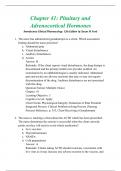
-
Chapter 41: Pituitary and Adrenocortical Hormones Introductory Clinical Pharmacology 12th Edition by Susan M Ford
- Exam (elaborations) • 20 pages • 2023
- Available in package deal
-
- $3.42
- + learn more
Introductory Clinical Pharmacology 12th Edition by Susan M Ford 1. The nurse has administered gonadotropin to a client. Which assessment finding should the nurse prioritize? a. Abdominal pain b. Visual disturbances c. Auditory disturbances d. Ascites Answer: B Rationale: If the client reports visual disturbances, the drug therapy is discontinued and the primary health care provider notified. An examination by an ophthalmologist is usually indicated. Abdominal pain and ascites are ...
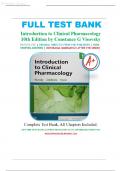
-
Test bank for Introduction to Clinical Pharmacology 10th Edition by Visovsky, Zambroski & Hosler, All Chapters 1-20, A+ guide.
- Exam (elaborations) • 249 pages • 2024
-
- $15.99
- + learn more
Test bank: INTRODUCTION TO CLINICAL PHARMACOLOGY 10TH EDITION BY Constance Visovsky, Cheryl Zambroski, Shirley Hosler ALL CHAPTERS Unit I. General Principles 1. Pharmacology and the Nursing Process in LPN Practice 2. Legal, Regulatory, and Ethical Aspects of Drug Administration 3. Principles of Pharmacology Unit II. Principals of Medication Administration 4. Drug Calculation: Preparing and Administering Drugs Unit III. Drug Categories 5. Drugs for Bacterial Infections 6. Drugs for Tuberculosis, ...

-
Chapter 52: Skin Disorder Topical Drugs Introductory Clinical Pharmacology 12th Edition by Susan M Ford
- Exam (elaborations) • 18 pages • 2024
-
- $3.20
- + learn more
Introductory Clinical Pharmacology 12th Edition by Susan M Ford 1. A nurse has administered topical benzocaine to a client in preparation for a minor treatment. The nurse will prioritize which findings if noted on the ongoing assessment? a. Stinging, tenderness, and sloughing b. Erythema, flaking, and dryness c. Transient burning sensation d. Oiliness or dryness of hair Answer: A Rationale: The nurse should monitor for stinging, tenderness, and sloughing in the client as adverse ...
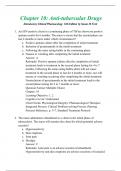
-
Chapter 10: Anti-tubercular Drugs Introductory Clinical Pharmacology 12th Edition by Susan M Ford
- Exam (elaborations) • 18 pages • 2023
- Available in package deal
-
- $3.67
- + learn more
Introductory Clinical Pharmacology 12th Edition by Susan M Ford 1. An HIV-positive client in a continuing phase of TB has shown no positive sputum results for 6 months. The nurse is aware that the second phase can last 4 months or more under which circumstances? a. Positive sputum culture after the completion of initial treatment b. Inclusion of pyrazinamide in the initial treatment c. Following the same eating habits in the continuing phase d. Nausea or vomiting after completing the ...
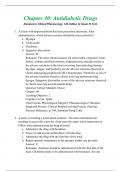
-
Chapter 40: Antidiabetic Drugs Introductory Clinical Pharmacology 12th Edition by Susan M Ford
- Exam (elaborations) • 19 pages • 2023
- Available in package deal
-
- $3.41
- + learn more
Introductory Clinical Pharmacology 12th Edition by Susan M Ford 1. A client with hyperinsulinism has been prescribed diazoxide. After administration, which adverse reaction should the nurse prioritize? a. Myalgia b. Tachycardia c. Flatulence d. Epigastric discomfort Answer: B Rationale: The nurse should monitor for tachycardia, congestive heart failure, sodium and fluid retention, hyperglycemia, and glycosuria as the adverse reactions in the client receiving diazoxide drug therap...
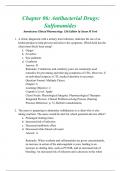
-
Chapter 06: Antibacterial Drugs: Sulfonamides Introductory Clinical Pharmacology 12th Edition by Susan M Ford
- Exam (elaborations) • 20 pages • 2023
- Available in package deal
-
- $3.24
- + learn more
Chapter 06: Antibacterial Drugs: Sulfonamides Introductory Clinical Pharmacology 12th Edition by Susan M Ford 1. A client, diagnosed with a urinary tract infection, indicates the use of an herbal product to help prevent and relieve the symptoms. Which herb has the client most likely been using? a. Ginger b. Feverfew c. Saw palmetto d. Cranberry Answer: D Rationale: Cranberries and cranberry juice are commonly used remedies for preventing and relieving symptoms of UTIs. However, i...
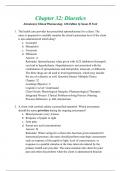
-
Chapter 32: Diuretics Introductory Clinical Pharmacology 12th Edition by Susan M Ford
- Exam (elaborations) • 18 pages • 2023
- Available in package deal
-
- $3.61
- + learn more
Introductory Clinical Pharmacology 12th Edition by Susan M Ford 1. The health care provider has prescribed spironolactone for a client. The nurse is prepared to carefully monitor the client's potassium level if the client is also administered which drug? a. Lisinopril b. Metoprolol c. Terazosin d. Diltiazem Answer: A Rationale: Spironolactone when given with ACE inhibitors (lisinopril) can lead to hyperkalemia. Hyperkalemia is not associated with the combination of spironolactone...
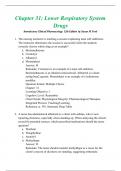
-
Chapter 31: Lower Respiratory System Drugs Introductory Clinical Pharmacology 12th Edition by Susan M Ford
- Exam (elaborations) • 18 pages • 2023
- Available in package deal
-
- $3.67
- + learn more
Introductory Clinical Pharmacology 12th Edition by Susan M Ford 1. The nursing instructor is teaching a session explaining mast cell stabilizers. The instructor determines the session is successful when the students correctly choose which drug as an example? a. Beclomethasone b. Cromolyn c. Albuterol d. Montelukast Answer: B Rationale: Cromolyn is an example of a mast cell stabilizer. Beclomethasone is an inhaled corticosteroid. Albuterol is a short-acting beta2 agonist. Monteluka...
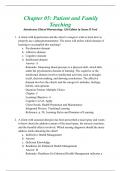
-
Chapter 05: Patient and Family Teaching Test Bank Introductory Clinical Pharmacology 12th Edition by Susan M Ford
- Exam (elaborations) • 22 pages • 2023
- Available in package deal
-
- $3.50
- + learn more
Chapter 05: Patient and Family Teaching Introductory Clinical Pharmacology 12th Edition by Susan M Ford 1. A client with hypertension and the client’s caregiver wish to learn how to properly use a sphygmomanometer. The nurse will utilize which domain of learning to accomplish this teaching? a. Psychomotor domain b. Affective domain c. Cognitive domain d. Intellectual domain Answer: A Rationale: Measuring blood pressure is a physical skill, which falls under the psychomotor doma...
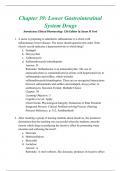
-
Chapter 39: Lower Gastrointestinal System Drugs Introductory Clinical Pharmacology 12th Edition by Susan M Ford
- Exam (elaborations) • 19 pages • 2023
- Available in package deal
-
- $3.44
- + learn more
Introductory Clinical Pharmacology 12th Edition by Susan M Ford 1. A nurse is preparing to administer sulfasalazine to a client with inflammatory bowel disease. The nurse should question this order if the client's record indicates a hypersensitivity to which drug? a. Enalapril b. Doxycycline c. Azithromycin d. Sulfamethoxazole/trimethoprim Answer: D Rationale: Sulfasalazine is an aminosalicylate. The use of aminosalicylates is contraindicated in clients with hypersensitivity to s...

$6.50 for your textbook summary multiplied by 100 fellow students... Do the math: that's a lot of money! Don't be a thief of your own wallet and start uploading yours now. Discover all about earning on Stuvia


